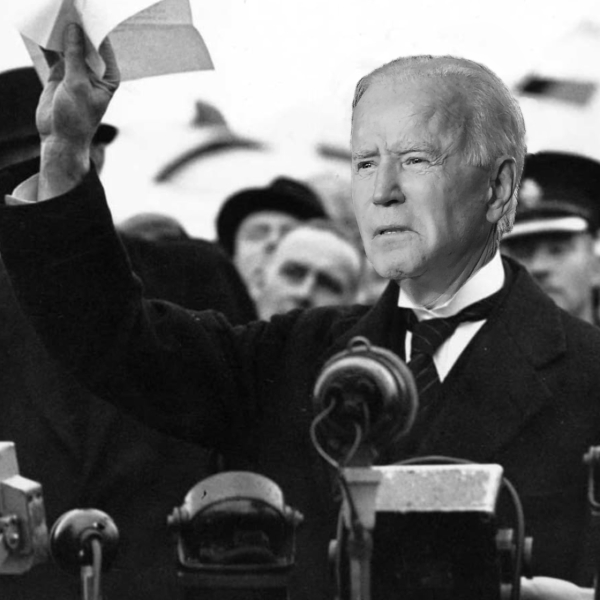Today and tomorrow, the foreign ministers of Israel, the US, Egypt, UAE, Bahrain, and Morocco are meeting at Kibbutz Sde Boker in Israel’s Negev desert. The topic is said to be the soon-to-be-signed nuclear deal with Iran. According to Israel’s ambassador to Bahrain, Secretary of State Anthony Blinken will “hear a strong position on Iran” from the other participants. If recent history is a guide, the Biden Administration will not be interested in what they think, and will convey to them as politely as possible (Blinken usually plays the Good Cop) that they’d better not rock the boat.
I am guessing that the deal will include a secret side agreement that the US will not allow its client states to take action against Iran. Ron Dermer, Israel’s former ambassador to the US, argues (podcast, about 28:00) that if a deal is signed, the US will likely act to restrain Israel from all activities against Iran, including her operations against Iranian bases and weapons shipments in Syria, on the grounds that these will cause the price of oil to go up.
The Saudi foreign minister did not attend, because Saudi Arabia, which chose not to join in the Abraham Accords, still does not have diplomatic relations with Israel. The reason for that is usually said to be because the elderly King Salman bin Abdulaziz does not wish to, even though the de facto ruler, Crown Prince Mohammed bin Salman (MBS) is secretly cooperating with Israel against Iran. I suspect, though, that the real reason is that MBS wants to hedge his bets.
Meanwhile, the attacks against Saudi Arabia by the Iran-sponsored Houthi rebels in Yemen were sharply escalated this weekend when they hit Aramco oil facilities in Jeddah, doing significant damage (and incidentally causing a spike in oil prices). The US issued a condemnation of the attack which said that America would “continue to support [its] partners in defense of their territory.” Although the statement mentioned that the Houthis get their weapons from Iran, it only called on the Houthis to cooperate with the pusillanimous UN to “de-escalate the conflict.” Compare this tepid response to 1990-91, when in response to Saddam Hussein’s invasion of Kuwait and threats against Saudi Arabia, President GHW Bush crushed the Iraqi military and sent troops to Saudi Arabia to protect the regime and insure stability in the oil market.
It’s possible to see the attack as a message from Iran to the Americans to hurry up and surrender the last shreds of their honor, agree to the remaining Iranian demands – including promises to rein in Israel – and sign the deal. How expensive can the administration let gas and heating oil get, with midterm elections coming? Brent crude is now hovering around $120/bbl., about twice what it was at this time last year. And just a couple of years ago, I thought that American energy independence was going to put an end to the effectiveness of the “oil weapon,” first wielded against Israel in 1973. How quickly things change.
The US is pressuring Israel to sanction Russia for its invasion of Ukraine. One might ask why this tiny country is so important. It’s not, really, even if a few Jewish oligarchs can land their private planes here. Former Ambassador Ron Dermer thinks that the intent is to drive a wedge between Israel and Russia. Russia controls the skies over Syria, and has been allowing Israel to bomb Iranian bases and weapons shipments there. This is extremely important, because 1) Iranian militias in Syria can open yet another front against Israel in the next war, and 2) the shipment of kits to upgrade the 130,000 rockets aimed at Israel from Lebanon into missiles accurate to within a few meters is an existential threat to the Jewish state. Israel can provide humanitarian assistance to Ukraine – Israel has set up a complete field hospital there – but there is a line that can’t be crossed. The Iranians would be happy to see an end to Russia’s cooperation with Israel. Perhaps they even suggested this to the American negotiators, whose lust for an agreement seems to know no bounds.
The perception of American interests held by the Biden Administration have diverged far from the interests of Israel. I think that PM Naftali Bennett and (especially) his Foreign and Defense Ministers, Yair Lapid and Benny Gantz respectively, are having a hard time internalizing this.
I am always cheered by signs of Israeli-Arab cooperation in the struggle against Iran’s attempt to turn the entire region into an Islamic caliphate ruled from Tehran, but the meeting at Sde Boker would have been more meaningful if it had included a representative from Saudi Arabia rather than one from the US.

